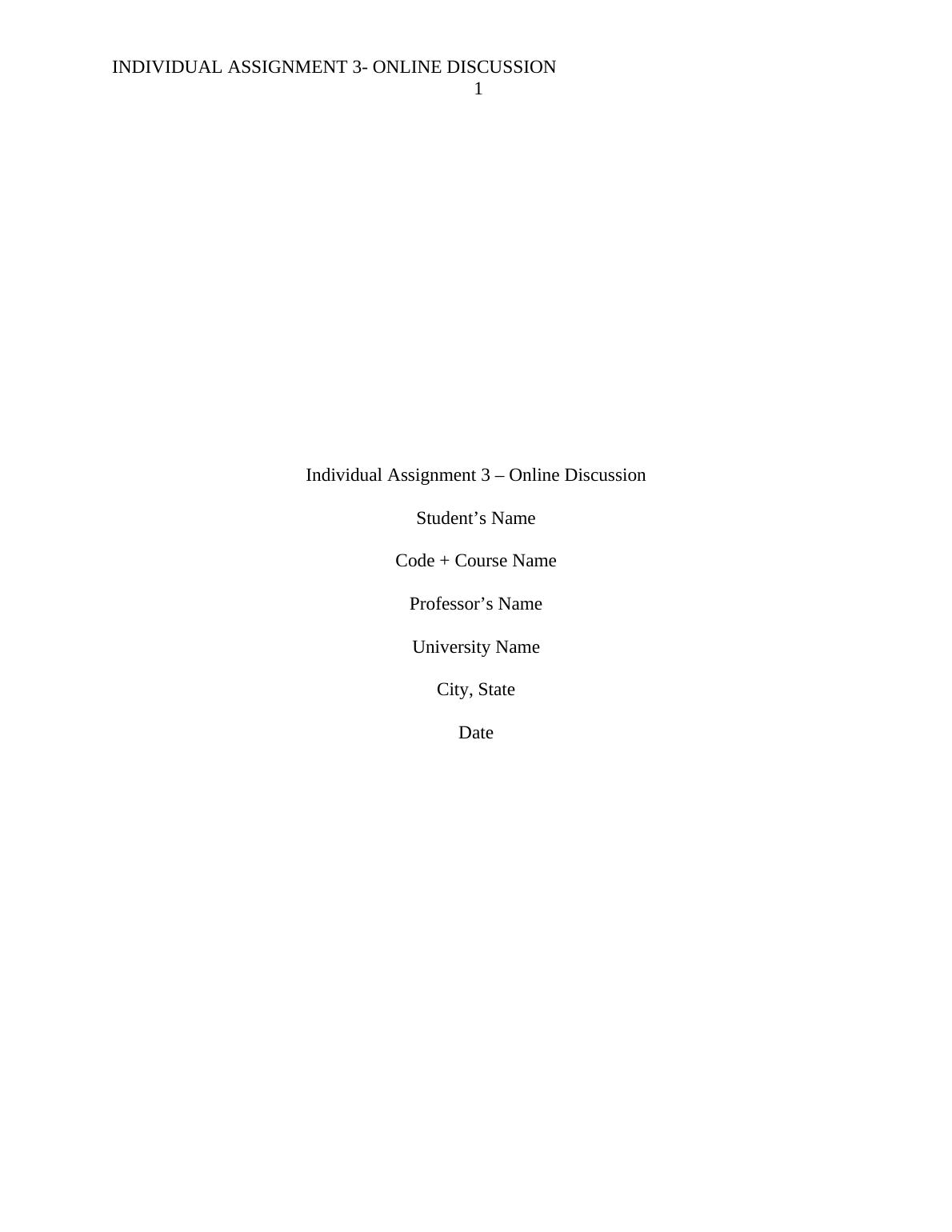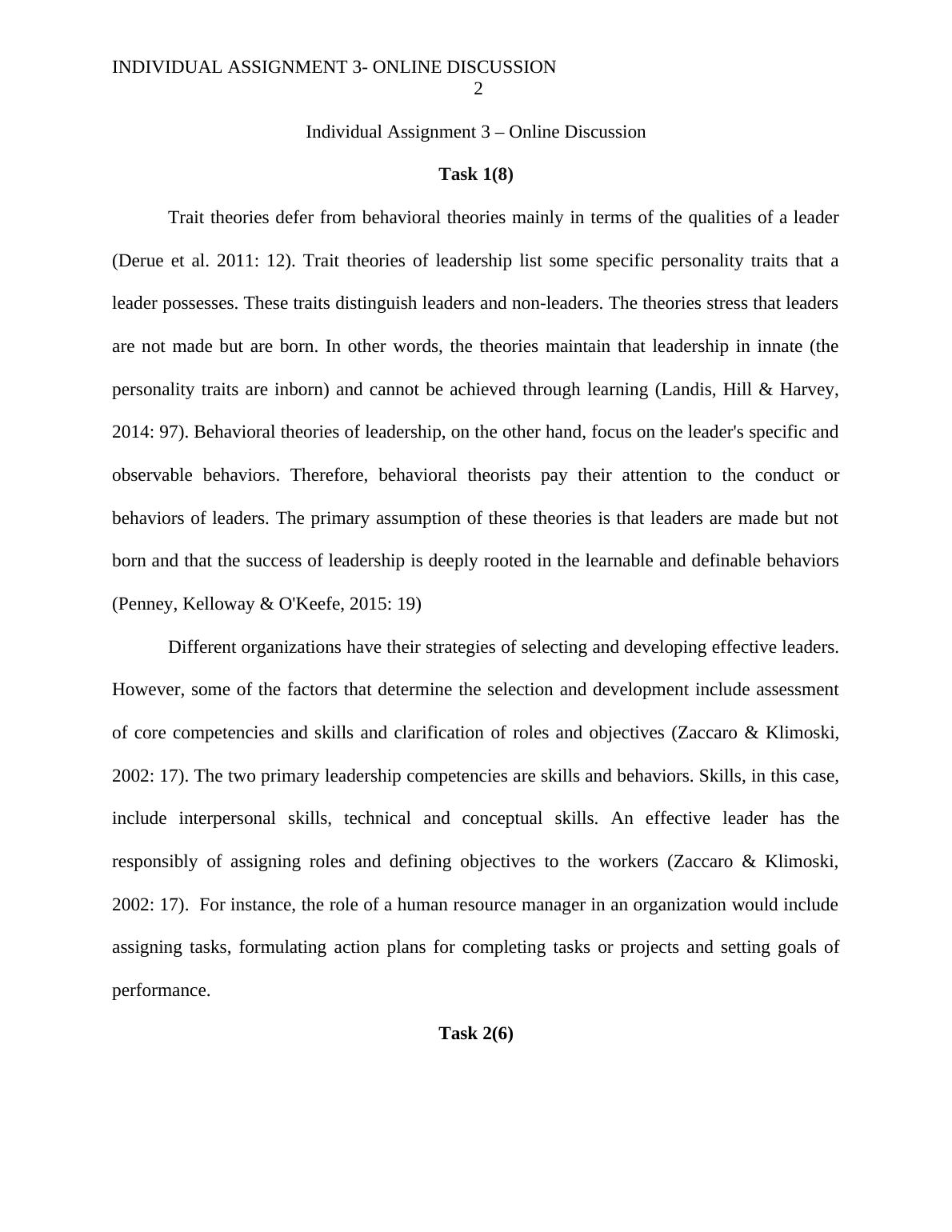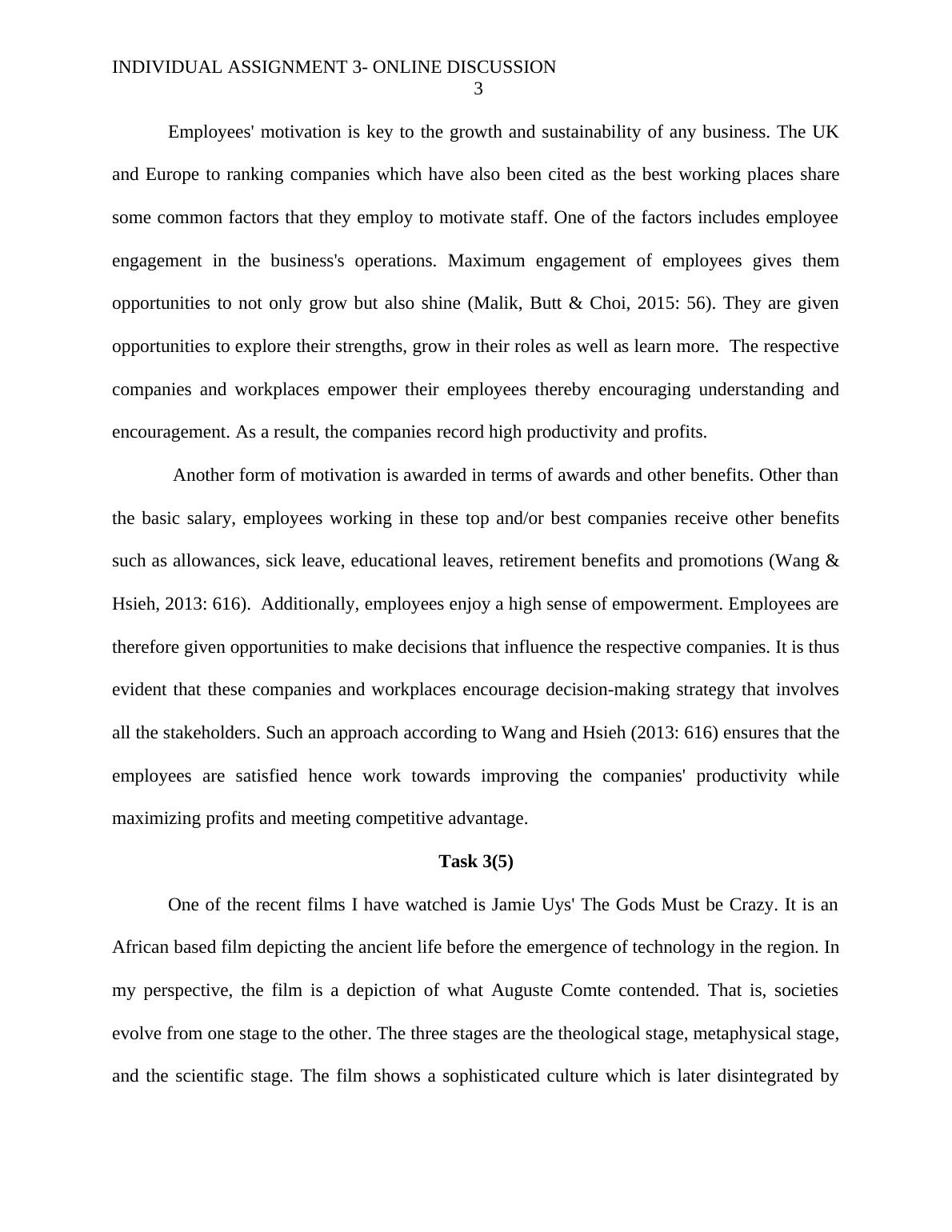Trait Theories and Behavioral Theories of Leadership
6 Pages1712 Words52 Views
Added on 2020-03-16
Trait Theories and Behavioral Theories of Leadership
Added on 2020-03-16
ShareRelated Documents
INDIVIDUAL ASSIGNMENT 3- ONLINE DISCUSSION
1
Individual Assignment 3 – Online Discussion
Student’s Name
Code + Course Name
Professor’s Name
University Name
City, State
Date
1
Individual Assignment 3 – Online Discussion
Student’s Name
Code + Course Name
Professor’s Name
University Name
City, State
Date

INDIVIDUAL ASSIGNMENT 3- ONLINE DISCUSSION
2
Individual Assignment 3 – Online Discussion
Task 1(8)
Trait theories defer from behavioral theories mainly in terms of the qualities of a leader
(Derue et al. 2011: 12). Trait theories of leadership list some specific personality traits that a
leader possesses. These traits distinguish leaders and non-leaders. The theories stress that leaders
are not made but are born. In other words, the theories maintain that leadership in innate (the
personality traits are inborn) and cannot be achieved through learning (Landis, Hill & Harvey,
2014: 97). Behavioral theories of leadership, on the other hand, focus on the leader's specific and
observable behaviors. Therefore, behavioral theorists pay their attention to the conduct or
behaviors of leaders. The primary assumption of these theories is that leaders are made but not
born and that the success of leadership is deeply rooted in the learnable and definable behaviors
(Penney, Kelloway & O'Keefe, 2015: 19)
Different organizations have their strategies of selecting and developing effective leaders.
However, some of the factors that determine the selection and development include assessment
of core competencies and skills and clarification of roles and objectives (Zaccaro & Klimoski,
2002: 17). The two primary leadership competencies are skills and behaviors. Skills, in this case,
include interpersonal skills, technical and conceptual skills. An effective leader has the
responsibly of assigning roles and defining objectives to the workers (Zaccaro & Klimoski,
2002: 17). For instance, the role of a human resource manager in an organization would include
assigning tasks, formulating action plans for completing tasks or projects and setting goals of
performance.
Task 2(6)
2
Individual Assignment 3 – Online Discussion
Task 1(8)
Trait theories defer from behavioral theories mainly in terms of the qualities of a leader
(Derue et al. 2011: 12). Trait theories of leadership list some specific personality traits that a
leader possesses. These traits distinguish leaders and non-leaders. The theories stress that leaders
are not made but are born. In other words, the theories maintain that leadership in innate (the
personality traits are inborn) and cannot be achieved through learning (Landis, Hill & Harvey,
2014: 97). Behavioral theories of leadership, on the other hand, focus on the leader's specific and
observable behaviors. Therefore, behavioral theorists pay their attention to the conduct or
behaviors of leaders. The primary assumption of these theories is that leaders are made but not
born and that the success of leadership is deeply rooted in the learnable and definable behaviors
(Penney, Kelloway & O'Keefe, 2015: 19)
Different organizations have their strategies of selecting and developing effective leaders.
However, some of the factors that determine the selection and development include assessment
of core competencies and skills and clarification of roles and objectives (Zaccaro & Klimoski,
2002: 17). The two primary leadership competencies are skills and behaviors. Skills, in this case,
include interpersonal skills, technical and conceptual skills. An effective leader has the
responsibly of assigning roles and defining objectives to the workers (Zaccaro & Klimoski,
2002: 17). For instance, the role of a human resource manager in an organization would include
assigning tasks, formulating action plans for completing tasks or projects and setting goals of
performance.
Task 2(6)

INDIVIDUAL ASSIGNMENT 3- ONLINE DISCUSSION
3
Employees' motivation is key to the growth and sustainability of any business. The UK
and Europe to ranking companies which have also been cited as the best working places share
some common factors that they employ to motivate staff. One of the factors includes employee
engagement in the business's operations. Maximum engagement of employees gives them
opportunities to not only grow but also shine (Malik, Butt & Choi, 2015: 56). They are given
opportunities to explore their strengths, grow in their roles as well as learn more. The respective
companies and workplaces empower their employees thereby encouraging understanding and
encouragement. As a result, the companies record high productivity and profits.
Another form of motivation is awarded in terms of awards and other benefits. Other than
the basic salary, employees working in these top and/or best companies receive other benefits
such as allowances, sick leave, educational leaves, retirement benefits and promotions (Wang &
Hsieh, 2013: 616). Additionally, employees enjoy a high sense of empowerment. Employees are
therefore given opportunities to make decisions that influence the respective companies. It is thus
evident that these companies and workplaces encourage decision-making strategy that involves
all the stakeholders. Such an approach according to Wang and Hsieh (2013: 616) ensures that the
employees are satisfied hence work towards improving the companies' productivity while
maximizing profits and meeting competitive advantage.
Task 3(5)
One of the recent films I have watched is Jamie Uys' The Gods Must be Crazy. It is an
African based film depicting the ancient life before the emergence of technology in the region. In
my perspective, the film is a depiction of what Auguste Comte contended. That is, societies
evolve from one stage to the other. The three stages are the theological stage, metaphysical stage,
and the scientific stage. The film shows a sophisticated culture which is later disintegrated by
3
Employees' motivation is key to the growth and sustainability of any business. The UK
and Europe to ranking companies which have also been cited as the best working places share
some common factors that they employ to motivate staff. One of the factors includes employee
engagement in the business's operations. Maximum engagement of employees gives them
opportunities to not only grow but also shine (Malik, Butt & Choi, 2015: 56). They are given
opportunities to explore their strengths, grow in their roles as well as learn more. The respective
companies and workplaces empower their employees thereby encouraging understanding and
encouragement. As a result, the companies record high productivity and profits.
Another form of motivation is awarded in terms of awards and other benefits. Other than
the basic salary, employees working in these top and/or best companies receive other benefits
such as allowances, sick leave, educational leaves, retirement benefits and promotions (Wang &
Hsieh, 2013: 616). Additionally, employees enjoy a high sense of empowerment. Employees are
therefore given opportunities to make decisions that influence the respective companies. It is thus
evident that these companies and workplaces encourage decision-making strategy that involves
all the stakeholders. Such an approach according to Wang and Hsieh (2013: 616) ensures that the
employees are satisfied hence work towards improving the companies' productivity while
maximizing profits and meeting competitive advantage.
Task 3(5)
One of the recent films I have watched is Jamie Uys' The Gods Must be Crazy. It is an
African based film depicting the ancient life before the emergence of technology in the region. In
my perspective, the film is a depiction of what Auguste Comte contended. That is, societies
evolve from one stage to the other. The three stages are the theological stage, metaphysical stage,
and the scientific stage. The film shows a sophisticated culture which is later disintegrated by

End of preview
Want to access all the pages? Upload your documents or become a member.
Related Documents
Leadership and Management Solution Assignment (Doc)lg...
|6
|1328
|25
The Trait Theory of Leadership | Assignmentlg...
|6
|1392
|444
Assignment on Behavioral Theory of Leadershiplg...
|11
|2602
|53
Traits and Behaviors of Early Leadership Theorieslg...
|8
|1664
|359
Organizational Behavior Assignment - Leadershiplg...
|7
|1693
|60
Leadership & Management Theories : Doclg...
|3
|820
|464
